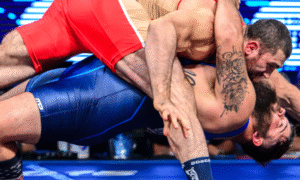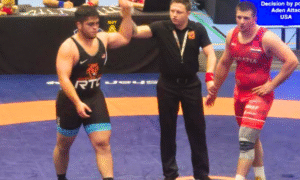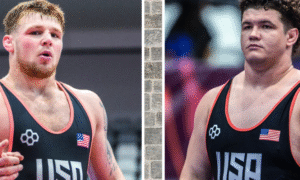It’s easy to notice John Stefanowicz. Whatever the event is, wherever it is, he has a habit of catching your attention. There’s just something about a guy who goes about his business unassumingly yet aggressively. Wrestling, when you strip away all of its superficial parameters, is, in its most basic form, a spotlight sport anyway. Two athletes, locked in battle. They fight each other, but together. It’s a mutual energy continuously borrowed and returned. But with the way competitions are formatted, certainly at the Senior level of Greco-Roman wrestling, people sometimes blend into one mass. Multiple matches are going on at once, there are announcements, whistles being blown, calls being argued…it’s an organized chaos.
But there are several wrestlers who steal your eyeballs and it’s not because they always win — after all, Stefanowicz isn’t currently carrying some legendary undefeated streak — but because every time out, the effort is both consistent and honest. You want honesty out there. Men giving their all, no matter what. Stefanowicz chases victory like a Jack Russell going after a squirrel in the yard. He gets red-faced, huffs in exertion, the kind of fighter who’d be doing this even if there was less fanfare involved in the trade than there already is.
At his core, however, Stefanowicz is also a Marine, a service member who just so happens to be fortunate enough to seek out the Olympic dream. It hasn’t been a straight shot to the National Greco-Roman circuit. There have been pauses in his career with ground to make up. Though, it’s been going well. This coming Friday, Stefanowicz is expected to be one of the names in the hunt at the 2017 US Greco-Roman World Team Trials in Las Vegas. His weight, 80 kilograms, is a tough one. There are numerous athletes in his bracket who represent serious challenges to Stefanowicz and everybody else. Comes with the territory. Considering how he has willed his career off the ground thus far, with its stops and starts, it is all just part of the process.
“When I first came to the team, it was October of 2011,” remembers Stefanowicz. “I re-enlisted in 2014 and went to intel. When I did that, I left the team. I think my last competition before I left was the World Team Trials in 2014 down in Daytona. Then I was back in fleet for a couple of years until last January. I was in a lot of different places doing a lot of different things, and they weren’t wrestling.”
That Stefanowicz, originally from Pennsylvania, has made his bones as a National-caliber competitor, is a testament to his drive. The usual path to the life of a Senior Greco-Roman wrestler has been formulaic for most. Either right before college or right after, you train full-time and compete either until all of your goals are met or your body just can’t do it anymore, whichever comes first. Stefanowicz is proof that if you stick to it, the ground you need to make up will appear just when the time is right. For him, that came recently, despite his years of experience prior to his most recent wrestling sabbatical.
“I got a couple of days and went to the Open and about two to three weeks after that is when I got the orders in January,” Stefanowicz explains. “My first tournament officially back was Schultz and then right into the Armed Forces (Championships) and Hungary.”
Stefanowicz placed fifth at the US Nationals, his second time finishing in the top five. His next time out at the aforementioned 2017 Dave Schultz Memorial International, Stefanowicz wound up one round short of the medal match following a narrow loss to Japan’s Shohei Yabiku, the eventual bronze medalist at the event. He was just getting back in gear. At the Armed Forces Championships, Stefanowicz went 2-1, his lone blemish an entertaining bout with the Army’s Dillon Cowan.
There was more work to be done. One of the first orders of business was saying goodbye to 75 kilograms. Stefanowicz, both on the University level and elsewhere, toiled around in and around that weight for most of his prior tournaments. It didn’t wear well any longer. “As soon as we got back from the Armed Forces, Coach (Jason) Loukides and I looked at each other like, ‘Yeah, that ain’t happening again.’ 80 is a good fit for where I am.”
A Valuable “Almost”
The higher weight would get a very serious test drive soon enough. In March, Stefanowicz joined a delegation of other US Greco-Roman athletes overseas for the Polyak Imre Memorial (the Hungarian Grand Prix), one of the most prestigious tournaments on the European calendar. For American combatants, it is a must. Much of the world’s best talent is present at the Grand Prix and one of its best perks is the training camp that takes place the week before. It is there wrestlers like Stefanowicz, who are green when it comes to the international way of doing things, are introduced to new angles in which to see the sport.
“That was the very first foreign camp I ever had,” informs Stefanowicz. “It’s so different, it’s almost hard to explain if you’re not there. There’s a different atmosphere in the room. Everyone is gritty, everyone has grit to them. When they’re drilling, they are going to take you down all the way. If they do an arm drag, they don’t just do the drag and stay standing, they take you down and then do a lift on top of that. When it comes to the live go’s, it’s balls to the walls. Everyone wasn’t just losing multiple pounds, they were losing multiple kilos. It was that intense.”
Good thing this guy likes intensity. At the tournament itself, Stefanowicz came very close to taking home what would have been the scalp of his career thus far. The day started off with a one-sided loss to former World Champion Peter Bacsi of Hungary (who would later go on to win the event by defeating American Geordan Speiller in the finals). Pulled into the repechage round, he got a new lease on life and took full advantage of it by grinding out Romanian Nicu Ojog 2-1. Stefanowicz missed out on the medal round at the Dave Schultz tournament. He did not at the Hungarian Grand Prix.
Standing across in the bronze medal match was Zurabi Datunashvili, a 25-year-old Georgian who has appeared at the last two Olympiads, owns a Junior World silver medal, and captured the top prize at 2016’s European Championships. On paper, this probably wasn’t supposed to be all that close. Datunashvili has faced the best on the planet throughout his career. Stefanowicz is just starting to grow his resume. But he was there. In it. The whole time. Stefanowicz grabbed the first lead of the bout on a passivity call against Datunashvili. The Georgian answered back shortly thereafter with an arm throw for two points. An arm throw by Stefanowicz that was countered put him down 4-1, though another passivity point came the Marine’s way towards the latter stages of the contest. That’s when things got interesting.
Up to this point, it was Datunashvili’s technical acuity versus Stefanowicz’s non-stop pressure, a fun combination to watch for any wrestling fan. Only, fan enjoyment wasn’t on Stefanowicz’s mind right then, not with the clock wasting away. He had to make something happen. With :15 left to work with, Stefanowicz went to yank another arm throw, decided against it, and then in one fell swoop, backed Datunashvili to the edge and appeared to throw him down off the boundary for four points. His fellow US wrestlers taking in the action matside erupted in boisterous cheers.
Controversy
Initially, there were no points awarded. Odd, but not that odd, considering the circumstances. Critical points at even more critical moments are not always awarded overseas. That’s how it seems, anyway. The (no) call was rightfully challenged by the US side, and the officials concluded the sequence was good for two points, not the four that would have put Stefanowicz in the lead, essentially earning him the victory. In Greco-Roman, the rule is that if an athlete touches down out of bounds, two points should be awarded. But Datunashvili clearly exposed his back — that means four, particularly because the action began in-bounds. The officials said Datunashvili did not go straight to his back, that his ankle hit the surface first. Thus, the win went the other way on criteria due to the higher-scoring maneuver Datunashvili performed in the opening period. It’s a match Stefanowicz acknowledges would have been nice to get.
“I remember going for that arm spin and he had already taken that step back to get ready to defend it,” Stefanowicz recalls. “As soon as I pulled it and I saw him step back, my hand was already starting to slip, so I decided to throw the thing right through and go body-to-body instead. My goal was to get behind like him I did and get four. Maybe if I could have gotten my head a little closer and if he wasn’t running out so fast, it could have been a different result. But shit happens.”
More importantly, or just as importantly, Stefanowicz proved a point. He can compete with these guys, provided he gets the chance to. It’s about growing, development. A few months ago, Stefanowicz was just entering back into the picture. There’s value in the sum of the experience and that is what he is most concerned with right now. “The result, I look at it and I keep going over it with my coaches, like ‘What do I have to work on?’ I want to keep the education of the sport, the understanding of it. It’s like when someone says they practice medicine because they’re a doctor. You know, they’re practicing and practicing. You can never figure it the hell out.
“I look at it in my head and I did everything that I set forth out to do. At the end of the day, I was happy with the way that I wrestled, but the result speaks for itself. Coming home, the thing that upset me was almost. Even when I was wrestling 74 or 75 kilos during my first stint on the team, I was always that ‘almost’ guy. Like the Universities in 2012, You almost won it, but what did you do? You lost to Sanders, or you almost made the bronze medal match at the Open the year after that, or whenever, but no, I think I lost to Speiller that year 3-1. Like in 2014, You almost made National Team, or, I almost won the states in high school, but I didn’t. I think that’s what pissed me off the most. Not the result, just that it was an ‘almost’ again. That’s what got to me more than anything.”
The pressure to succeed & the excitement to do so
One of Stefanowicz’s best Greco-Roman attributes is his ability to create productive forward movement. Yes, pressure. Pressure — beautiful, unrelenting, volatile pressure is a weapon of his and it isn’t a secret. It’s partly what has helped him carve out his place in the sport and it is also what allowed him to take one of the world’s best wrestlers to the breaking point. Pressure is his style and certainly, something his opponents can look forward to dealing with (or not) at the World Team Trials. As his skill-set has become more formidable, Stefanowicz is discovering a middle ground on when enough is enough and how to allow his offense to spring up with an increased technical flair. His coach has played a mighty role in this area.
“We’ve actually had to reign it in a little bit,” he says. “When I first came on the team and before I left, the Marines, we weren’t as technical. Everyone was hardheaded hardasses. We were brawlers as much as we were wrestlers. I’ve always had that on the Senior circuit, Pressure, pressure, pressure. What I lacked were the throws and being technical with it. Once Coach Loukides came on, he is always finding ways to bring technique into the game. I’ll say, ‘Hey coach, I’ve got this move…’, and then he’ll tell me seven different ways it can be done and then how to counter them (laughs). It’s a nonstop thing. It is what he’s brought, that’s all him.”
When business opens on Friday Stefanowicz will be a participant in one of the deepest weight classes of the tournament. There’s Speiller, the dazzling showman with a vast array of moves and the type of speed that leaves his opposition flummoxed; 2011 World Team member and two-time National Champion Cheney Haight, one of the country’s most durable and respected athletes and a man who has defeated Stefanowicz twice in recent months; Barrett Stanghill, a young but experienced prospect who owns a few noteworthy wins and is viewed as someone with a very bright future. There are more, plenty more, to go along with Stefanowicz and the three mentioned above. But that’s part of the fun. Greco-Roman needs hyper-competitive situations because it is what provides for the greatest theater. The athletes need it as much as the fans do. You bring up the word “exciting” to Stefanowicz and he happily agrees with the sentiment.
“That’s the perfect word for it,” says Stefanowicz. “I really feed off that, guys on the team and a lot of wrestlers throughout feed off that. It’s not a boring weight. They know no matter where the seeding is, who your first match is, who the final is, there are going to be fireworks. There is going to be a crowd of people around that match watching it unfold. That’s our whole thing, putting on a show for them (fans). It is going to create a chain reaction, just being a part of it. That is creating the excitement. Once you push the envelope and you go for the bigger throws, and score more, it makes the matches more exciting and it is undoubtedly going to be.”
With such little time before the start of the Trials, Stefanowicz is comfortable. He is enjoying not having to drain his body to make weight (“There are wrestlers who cut weight and there are weight-cutters who wrestle.”) and he knows he’s progressing in a sport where falling behind is not an option. A lot of that is his coach, a lot of that is him, and all of it matters. He’s in a good position. That he is aware of, as well. Whatever shakes out by Friday evening, we know two things for sure — Stefanowicz is here, now, and he can’t wait to let it loose.
“Coming up to this, I’m excited, more excited than I have been in the past and so far, that has been the best thing about it. Not just being able to wrestle, but being genuinely excited for it.”
SUBSCRIBE TO THE FIVE POINT MOVE PODCAST
iTunes | Stitcher | Spreaker | Google Play Music | RSS


















